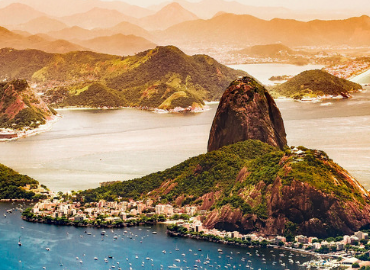Why study in Brazil?
Studying in Brazil offers various advantages and opportunities for international students. Here are some to highlight the benefits of studying in Brazil:
Cultural Diversity: Brazil is a diverse country with a rich mix of cultures, traditions, and ethnicities. Studying in Brazil allows you to immerse yourself in a multicultural society and meet people from different backgrounds.
Quality Education: Brazil has high-level universities and schools that provide quality education in a wide range of academic fields. Many Brazilian institutions are internationally recognized, offering competitive study programs. Additionally, there is a wide variety of academic programs, from undergraduate degrees to technical and postgraduate courses in various fields of study.
Varied Climate and Landscapes: Brazil is known for its natural beauty, including stunning beaches, tropical rainforests, mountains, and waterfalls. Studying in Brazil allows you to enjoy its geographical and climatic diversity. The country is also known for its affordable cost of living, with international students finding reasonable accommodation and dining options.
Research and Internship Opportunities: Some Brazilian universities offer research and internship opportunities in collaboration with local and international companies and institutions, enriching your academic and professional experience.
Learn Portuguese: Studying in Brazil provides you with the opportunity to learn and improve your Portuguese skills, the official language of the country. Acquiring a new language can be a valuable skill in the global job market.
Fun Student Life: Brazil has a lively student life and offers a variety of extracurricular activities, artistic events, and sports activities that bring the community together to celebrate and grow in culture.
Hospitality and Warmth: Brazilians are known for their hospitality and warmth towards foreigners. You will be welcomed into the local community and have the chance to make friends from different parts of the world. Additionally, studying in Brazil provides the opportunity to immerse yourself in Brazilian culture, enjoy its music, dances, festivals, and unique cuisine.
What can I study in Brazil?
As a foreigner, you have the opportunity to study a wide variety of academic programs in Brazil. Some options to consider include:
-
University Programs: Brazil offers a variety of university degrees in areas such as engineering, medicine, social sciences, business administration, law, architecture, among other specialties. Additionally, there are postgraduate programs, master's, and doctoral degrees in various academic disciplines.
-
Languages: If you are interested in learning or improving your Portuguese, many institutions offer language courses for foreigners.
-
Academic Exchanges: Some Brazilian universities have exchange programs for international students, providing more opportunities to travel for study.
-
Technical and Vocational Training Programs: Brazil also offers technical and vocational training programs in areas such as tourism, gastronomy, design, technology, among others.
-
Research and Scientific Studies: If you are interested in research, some universities and study centers in Brazil offer opportunities for scientific studies in various fields.
-
Arts and Humanities: You have various branches to choose from when focusing on areas dominated by art, humanities, and social sciences, such as literature, history, art, anthropology, etc.
It's essential to research the specific options and requirements of each program and university in Brazil to find the one that best suits your interests and academic goals. Check the websites of educational institutions and government education agencies in Brazil for up-to-date information on academic offerings for international students.
What do I need to study in Brazil?
To study in Brazil as an international student, you need to meet certain requirements and follow a application process. The main steps and requirements include:
-
Obtaining a Student Visa and Choosing a Study Program: You must apply for a student visa at the consulate or embassy of Brazil in your home country. To do this, you'll need to submit an acceptance letter from a Brazilian educational institution and fulfill other documents required by the consulate. Select a Brazilian educational institution and the study program you wish to pursue. Ensure that the program is recognized by the Brazilian Ministry of Education.
-
Checking Academic Requirements: Verify the academic and language requirements necessary for the program you wish to apply to. Some institutions may require proficiency exams or specific language tests.
-
Obtaining Health Insurance and Financial Means Verification: You must have valid and adequate health insurance throughout your stay in Brazil. You also need to demonstrate that you have sufficient financial means to cover your study and living expenses in Brazil. Some institutions may also require advance payment of tuition fees.
-
Applying to the Educational Institution: Submit your admission application to the Brazilian educational institution. Make sure to meet all application requirements and submit the necessary documentation for acceptance.
-
Obtaining Acceptance Letter and Student Visa: Once admitted to the educational institution, you will receive an acceptance letter, which you will need to apply for a student visa at the Brazilian consulate or embassy in your home country. With the acceptance letter and required documents, apply for the student visa.
-
Traveling to Brazil: Once you have obtained the student visa, you can travel to Brazil and start your studies.
It's important to start the application and visa process well in advance, as it may take time to complete all the necessary procedures. Check the website of the Brazilian Ministry of Foreign Affairs and specific educational institutions for detailed and updated information on requirements and procedures for studying in Brazil as an international student.
Useful information about Brazil
SALARY AND TAXES
Hourly wage: BRL 7 ($1.36)
Taxes: 7.5%-27.5% (progressive tax system)
*At XPA, we support you with your tax refund if you meet the requirements to apply for it once you have completed your trip and/or the calendar year for taxes.
![]()
Accommodation (Cost per person in a shared house/apartment):
Cities: BRL 500 - BRL 1,500
Towns: BRL 300 - BRL 1,000
Utilities (electricity, heating, water, trash): BRL 150 - BRL 300
Groceries: BRL 100 - BRL 200
Public transport: NZD $100 - NZD $200
Other expenses (eating out, entertainment, personal care): BRL 300 - BRL 600
Total: Approximately BRL 1,050 - BRL 3,300 ($639.58)

VISAS AVAILABLE WITH OUR PROGRAMS
Working Holiday: No
Nomad: Yes
Study Visa: Yes
Job Seeking Visa: No
Why experience Brazil?










Other programs in Brazil

Student Exchange Brazil
This program is a cultural and academic exchange for high school students allowing you to have a cultural immersion experience, improving language skills, and also connect you with friends from all over the world for a few weeks, a quarter, a semester, or an academic year in Brazil.

Language Courses
At XPA, we collaborate with the best schools and universities worldwide for language learning, and we provide highly competitive prices for the course you are looking for. Get a quote with us!

Working Holiday Brazil
Participants in the Working Holiday Brazil program have the opportunity to work in the country during their stay while getting to know the culture and the people of the land of samba and caipirinha. Don't miss it out!




